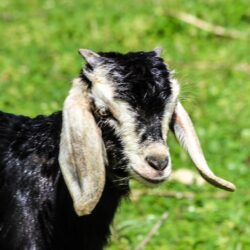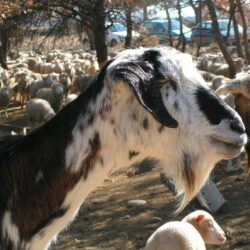| Source (Aramaic) | Translation (Provençal-French) | Translation (English) |
|---|---|---|
חַד גַּדְיָא, חַד גַּדְיָא. דְּזַבִּן אַבָּא בִּתְרֵי זוּזֵי, חַד גַּדְיָא, חַד גַּדְיָא. |
Un cabri, un cabri, Qué avié aciéta moun païré, Un escu, douz escu. Had gadiâ! had gadiâ! |
One little goat, one little goat that my father bought for two zuzim. One little goat, one little goat. |
וְאָתָא שֻׁנְרָא וְאָכְלָה לְגַדְיָא, דְּזַבִּן אַבָּא בִּתְרֵי זוּזֵי, חַד גַּדְיָא, חַד גַּדְיָא. |
Es vengu lou ca, A mangia lou cabri, Qué avié aciéta moun païré. Un escu, douz escu. Had gadiâ! had gadiâ! |
A cat came and ate the goat that my father bought for two zuzim. One little goat, one little goat. |
וְאָתָא כַּלְבָּא וְנָשַׁךְ לְשֻׁנְרָא, דְּאָכְלָה לְגַדְיָא, דְּזַבִּן אַבָּא בִּתְרֵי זוּזֵי, חַד גַּדְיָא, חַד גַּדְיָא. |
Es véngu lou ein, A mourdu lou ca, Qué avié mangia lou cabri, Qué avié aciéta moun païré, Un escu, douz escu. Had gadiâ! had gadiâ! |
A dog came and bit the cat that ate the goat that my father bought for two zuzim. One little goat, one little goat. |
וְאָתָא חֻטְרָא וְהִכָּה לְכַלְבָּא, דְּנָשַׁךְ לְשֻׁנְרָא, דְּאָכְלָה לְגַדְיָא, דְּזַבִּן אַבָּא בִּתְרֵי זוּזֵי, חַד גַּדְיָא, חַד גַּדְיָא. |
Es vengu lou bastoun, A battu lou ein, Qué avié mourdu lou ca, Qué avié mangia lou cabri, Qué avié aciéta moun païré. Un escu, douz escu. Had gadiâ! had gadiâ! |
A stick came and hit the dog that bit the cat that ate the goat that my father bought for two zuzim. One little goat, one little goat. |
וְאָתָא נוּרָא וְשָׂרַף לְחֻטְרָא, דְּהִכָּה לְכַלְבָּא, דְּנָשַׁךְ לְשֻׁנְרָא, דְּאָכְלָה לְגַדְיָא, דְּזַבִּן אַבָּא בִּתְרֵי זוּזֵי, חַד גַּדְיָא, חַד גַּדְיָא. |
Es vengu lou fiau, A brula lou bastoun, Qué avié battu lou cin, Qué avié mourdu lou ca, Qué avié mangia lou cabri, Qué avié aciéta moun païré, Un escu, douz escu. Had gadiâ! had gadiâ! |
A fire came and burned the stick that hit the dog that bit the cat that ate the goat that my father bought for two zuzim. One little goat, one little goat. |
וְאָתָא מַיָּא וְכָבָה לְנוּרָא, דְּשָׂרַף לְחֻטְרָא, דְּהִכָּה לְכַלְבָּא, דְּנָשַׁךְ לְשֻׁנְרָא, דְּאָכְלָה לְגַדְיָא, דְּזַבִּן אַבָּא בִּתְרֵי זוּזֵי, חַד גַּדְיָא, חַד גַּדְיָא. |
Es véngu l’aïga, A amoussa lou fiau, Qué avié brula lou bastoun, Qué avié battu lou cin, Qué avié mourdu lou ca, Qué avié mangia lou cabri, Qué avié aciéta moun païré, Un escu, douz escu. Had gadiâ! had gadiâ! |
Water came and put out the fire that burned the stick that hit the dog that bit the cat that ate the goat that my father bought for two zuzim. One little goat, one little goat. |
וְאָתָא תּוֹרָא וְשָׁתָא לְמַיָּא, דְּכָבָה לְנוּרָא, דְּשָׂרַף לְחֻטְרָא, דְּהִכָּה לְכַלְבָּא, דְּנָשַׁךְ לְשֻׁנְרָא, דְּאָכְלָה לְגַדְיָא, דְּזַבִּן אַבָּא בִּתְרֵי זוּזֵי, חַד גַּדְיָא, חַד גַּדְיָא. |
Es vengu lou biauou, A bégu l’aïga, Qué avié amoussa lou fiau, Qué avié brula lou bastoun, Qué avié battu lou cin, Qué avié mourdu lou ca, Qué avié mangia lou cabri, Qué avié aciéta moun païré, Un escu, douz escu. Had gadiâ! had gadiâ! |
An ox came and drank the water that put out the fire that burned the stick that hit the dog that bit the cat that ate the goat that my father bought for two zuzim. One little goat, one little goat. |
וְאָתָא הַשּׁוֹחֵט וְשָׁחַט לְתוֹרָא, דְּשָׁתָא לְמַיָּא, דְּכָבָה לְנוּרָא, דְּשָׂרַף לְחֻטְרָא, דְּהִכָּה לְכַלְבָּא, דְּנָשַׁךְ לְשֻׁנְרָא, דְּאָכְלָה לְגַדְיָא, דְּזַבִּן אַבָּא בִּתְרֵי זוּזֵי, חַד גַּדְיָא, חַד גַּדְיָא. |
Ès vengu lou Sohet,[1] Le sacrificateur: l’égorgeur des animaux bons à manger. Qué a sahata (égorgé) lou biauou, Qué avié bégu l’aïga, Qué avié amoussa lou fiau, Qué avié brula lou bastoun, Qué avié battu lou cin, Qué avié mourdu lou ca, Qué avié mangia lou cabri, Qué avié aciéta moun païré, Un escu, douz escu. Had gadiâ! had gadiâ! |
A shoḥet came[2] The sacrificer: the butcher of animals acceptable [kosher] to eat. and slaughtered the ox that drank the water that put out the fire that burned the stick that hit the dog that bit the cat that ate the goat that my father bought for two zuzim. One little goat, one little goat. |
וְאָתָא מַלְאַךְ־הַמָּ֫וֶת וְשָׁחַט לְשׁוֹחֵט, דְּשָׁחַט לְתוֹרָא, דְּשָׁתָא לְמַיָּא, דְּכָבָה לְנוּרָא, דְּשָׂרַף לְחֻטְרָא, דְּהִכָּה לְכַלְבָּא, דְּנָשַׁךְ לְשֻׁנְרָא, דְּאָכְלָה לְגַדְיָא, דְּזַבִּן אַבָּא בִּתְרֵי זוּזֵי, חַד גַּדְיָא, חַד גַּדְיָא. |
Es vengu l’Angé de la Mort, Qué a sahata lou Sohet, Qué avié sahata lou biauou, Qué avié bégu l’aïga, Qué avié amoussa lou fiau, Qué avié brula lou bastoun, Qué avié battu lou cin, Qué avié mourdu lou ca, Qué avié mangia lou cabri, Qué avié aciéta moun païré, Un escu, douz escu. Had gadiâ! had gadiâ! |
The Angel of Death came and slaughtered the shoḥet who slaughtered the ox that drank the water that put out the fire that burned the stick that hit the dog that bit the cat that ate the goat that my father bought for two zuzim. One little goat, one little goat. |
וְאָתָא הַקָּדוֹשׁ־בָּרוּךְ־הוּא וְשָׁחַט לְמַלְאַךְ־הַמָּ֫וֶת דְּשָׁחַט לְשׁוֹחֵט, דְּשָׁחַט לְתוֹרָא, דְּשָׁתָא לְמַיָּא, דְּכָבָה לְנוּרָא, דְּשָׂרַף לְחֻטְרָא, דְּהִכָּה לְכַלְבָּא, דְּנָשַׁךְ לְשֻׁנְרָא, דְּאָכְלָה לְגַדְיָא, דְּזַבִּן אַבָּא בִּתְרֵי זוּזֵי, חַד גַּדְיָא, חַד גַּדְיָא. |
Es vengu Hakkadoss Baruch Hu (le Saint béni soit-il). Qué a sahata l’Angé dè la Mort Qué avié sahata lou Sohet, Qué avié sahata lou biauou Qué avié bégu l’aïga, Que avié amoussa lou fiau, Qué avié brula lou bastoun, Qué avié battu lou cin, Qué avié mourdu lou ca, Qué avié mangia lou cabri, Qué avié aciéta moun païré, Un escu, douz escu. Had gadiâ! had gadiâ! |
Then the blessed Holy One came and slaughtered the Angel of Death who slaughtered the shoḥet who slaughtered the ox that drank the water that put out the fire that burned the stick that hit the dog that bit the cat that ate the goat that my father bought for two zuzim. One little goat, one little goat. |
This is “Had Gadiâ | Un Cabri: La Légende de l’Agneau (Poésie chaldaico-provençale, chantée a la table de famille les soirs de Paques),” a translation of Ḥad Gadya into Provençal-French by Dom Pedro Ⅱ (1825-1891), emperor of Brazil, as published in Poésies hébraïco-provençales du rituel israélite comtadin traduites et transcriptes par S. M. D. Pedro Ⅱ, de Alcântara, empereur du Brésil (1891), pp. 45-59. A note on the last page indicates the translation was made in Vichy, France on 30 July 1891. In his introduction (pp. viii-xi), he writes:
Le Had gadiâ, chant d’«un chevreau», est plus régulier. Ecrit en chaldéen, c’est un simple exposé des conséquences rémunératrices qui s’enchaînent dans l’humanité, et n’offre rien de particulier au point de vue de la versification. Il n’est placé dans ce recueil que parce qu’à la table de famille on le traduit en langue provençale, laquelle était assurément au moyen-âge, la langue habituelle des israélites du Comtat et est demeurée en usage dans la cérémonie des soirées pascales chez les Hébreux de Vancien Comtat-Venaissin.
The Had gadiâ, song of “a kid”, is more regular. Written in Chaldean, it is a simple exposition of the remunerative consequences that follow one another in humanity, and offers nothing particular from the point of view of versification. It is placed in this collection only because at the family table it is translated into Provençal, which was certainly in the Middle Ages the usual language of the Israelites of the Comtat and remained in use in the ceremony of the Paschal evenings among the Hebrews of Vancien Comtat-Venaissin.
The earliest known appearance of “Ḥad Gadya,” by an unknown author, can be found, handwritten, in the Prague Haggadah (1526). The Aramaic has been vocalized according to the Prague Haggadah (1590). Besides the transcription of the Aramaic with its vocalization, I have also added a translation adapted from Eve Levavi Feinstein’s Passover Haggadah translation. –Aharon N. Varady
Source

Notes
| 1 | Le sacrificateur: l’égorgeur des animaux bons à manger. |
|---|---|
| 2 | The sacrificer: the butcher of animals acceptable [kosher] to eat. |
| 3 | Ce chant traditionnel se trouve dans le Rituel des soirées de Pâques, connu sous le nom de הַגָּדָה = haggadâ: du nom de la partie homilétique du Talmud, d’où il a été tiré. (Seder Hakkontérès כז) |
| 4 | This traditional song is found in the Passover Evening Ritual, known as הַגָּדָה = haggadâ: from the name of the homiletic part of the Talmud, from which it was taken. (Seder Hakkontérès כז) |

“חַד גַּדְיָא | Un Cabri: La Légende de l’Agneau, a French translation of Ḥad Gadya by Dom Pedro Ⅱ, emperor of Brazil (1891)” is shared through the Open Siddur Project with a Creative Commons Attribution-ShareAlike 4.0 International copyleft license.









Leave a Reply